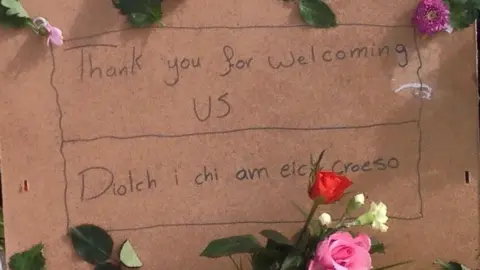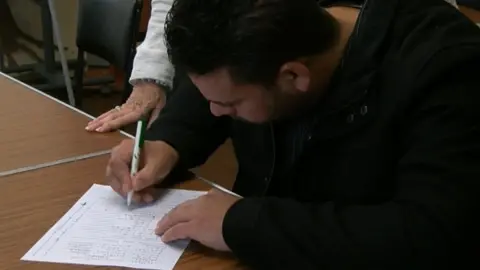Syrian refugee language classes 'shortage' in Wales
 Lindsay Cardwell
Lindsay Cardwell There is a shortage of appropriate English classes for resettled Syrian refugees in Wales, according to people who deliver the tuition.
They have raised concerns refugees may find it more difficult to find employment and become financially self-sufficient as a result.
It comes after a report found gaps in tuition provision across the country.
The Home Office said it had pledged £10m to help local authorities make sure more tuition was available.
To the end of March, a total of 472 people had been resettled to Wales under the Syrian Vulnerable Person Resettlement Programme, which began in September 2015.
Everyone over the age of 19 is entitled to free English language tuition.
But the report by the Wales Strategic Migration Partnership, based in Cardiff, found only two of Wales' 22 local authorities reported "no gaps" in local provision. Failings included a lack of suitable courses and qualified teachers.
Dr Mike Chick, senior lecturer in Teaching English for Speakers of other Languages at the University of South Wales, said there should be more money for tailored courses.
"The biggest issue is funding, families are coming over and by and large most of them have a very limited command of English, therefore, they need quite an intensive programme of language tuition," he said.
"They are all in the same class, so, instead of having tailored, effective, level based classes - all the learners are currently in the same class, which doesn't really make for the most effective teaching of English."
The Home Office provides Welsh councils with £8,250 per person to pay for health, housing, education and ESOL (English as a second language) lessons for refugees under the resettlement programme.
This drops to £1,000 by the fifth and final year of support, with the aim of resettled refugees becoming self-sufficient in that time.
But there is concern that a lack of tailored English tuition means some will not achieve this goal.
Erica Williams, ESOL co-ordinator for the partnership, said there was a lot of good practice among councils in Wales.

But she said making sure the right tuition gets to the right person was taking longer than expected.
"I think the idea was that after 12 months in this country families would be ready to move on, to be more independent - that isn't necessarily happening," she said.
"We have to be aware there are troughs and dips and peaks in re-settlement in a different culture and it's not going to be straightforward moving forward, we need to be able to adapt to the needs of different people."
The Home Office, which funds English language tuition for the resettlement programme, said the UK was resettling people on an "unprecedented scale" with more than 8,500 people, half of whom were children, having arrived on the Vulnerable Person Resettlement Scheme.
"We recognise that refugees need to be helped to integrate into society and we have put in place significant measures to ensure this can happen," said a spokesman.
"On English language skills specifically, this has included providing £10m to help local authorities make sure more tuition is available and introducing measures to ensure resettled refugees have access to eight hours' formal tuition a week."
